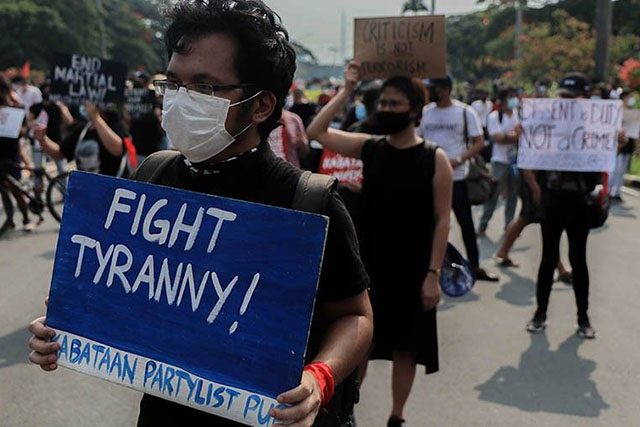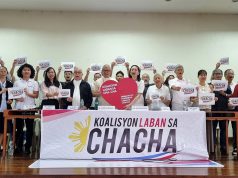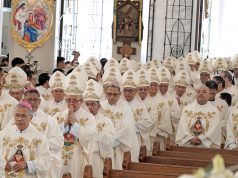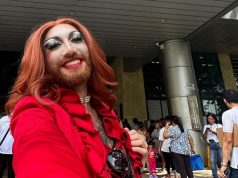
Concerns were raised when another proposed legislative measure recently passed the second reading of the lower chamber which has provisions that highly regulate gatherings for three years as supposed health and safety measures in light of the COVID-19 pandemic.
House Bill 6864, otherwise known as the Better Normal Bill or the “Better Normal for the Workplace, Communities and Public Spaces Act of 2020” aims to set strict safety and physical distancing protocols to prevent the further spread of the viral disease once community quarantine measures are fully lifted.
It seeks to impose the mandatory wearing of face masks, temperature checks, the availability of handwashing and sanitizing stations in public areas, contract-tracing systems and the establishment of government-operated quarantine facilities, among others.
The bill also prohibits public gatherings but some may be “subject to the exemptions” under the implementing rules and regulations (IRR) of the measure.
Private gatherings, on the other hand, are highly regulated and might need a permit from the local government unit (LGU) “if necessary.”
House Majority Leader Martin Romualdez, the co-chairperson of the House Defeat Covid-19 Committee, said that the measure aims “to lay the groundwork that will expedite our people’s adaptation to the demands of the new normal life.”
“Through physical distancing and other stringent safety and health protocols, we can also keep our families safe and prevent the spread of COVID-19 in our communities,” Romualdez said.
“We have no choice but to adapt to the new normal. The soonest time possible, the better,” he added.
The bill passed the second reading of the House of Representatives on June 4, according to latest reports.
It will need to hurdle a third reading and be approved on separate readings by the Senate before it gets signed into law.
Repression of civil rights?
Critics have claimed that some of its provisions under the “Standards for Better Normal” section, particularly in the “Management of Space,” appear to “intrude on everyone’s privacy and restrict the right to assemble and organize.”
The provisions include the right of the LGUs to “regulate public gatherings, as well as the flow of people in government-managed public spaces.”
They may also “issue a Better Normal Permit to provide limitations on such public gathering in order to prevent disease transmission.”
Meanwhile, private gatherings “in privately-managed spaces” are expected to comply with the guidelines of the bill’s IRR, which include the possibility of securing a permit from an LGU “if necessary.”
The nature of the private gathering, as well as the number of expected attendees, size of the venue and other factors may also be asked to supposedly “ensure compliance of physical distancing and other measures to prevent transmission of the virus.”
Several business groups have aired their concerns about the bill and urged the Congress to “reallocate resources and grant additional funding for the DOH (Department of Health) and LGUs” to improve the existing “Mandatory Reporting of Notifiable Diseases and Health Events of Public Health Concern Act.”
“The Mandatory Safety Measures in Section 3, Workplace-Specific Protocols in Section 5, and Workplace Management Plan in Section 6 are response strategies that are the most effective on a sub-national or local level,” the groups said.
Some of its signatures include the Makati Business Club, the American Chamber of Commerce of the Philippines, Inc., the European Chamber of Commerce of the Philippines and the Foundation for Economic Freedom, among others.
A Twitter user similarly warned Filipinos about the bill’s provisions on gatherings.
Hi guys, just a heads up. HB6864 or the Better Normal for the Workplace, Communities, and Public Spaces Act criminalizes public gatherings and private gatherings without a government permit (called the Better Normal Permit) for the next three years. pic.twitter.com/3LupYzLu7k
— seiruhhhh 🦙 (@lakwatsarah) June 2, 2020
Rauf Sissay, a human rights activist, claimed that the new normal bill could be “abused” to further repress Filipinos’ civil and political rights.
Independent musician BP Valenzuela similarly claimed that lawmakers were “using” the pandemic to prevent people from organizing and protesting.
RELATED: Cebu police arrest 7 anti-terror bill protesters, trap scores in UP Cebu
“We won’t stand for this blatant abuse of power where they spit in our faces when we ask to be heard. Mga kawatan at inutil lang dapat matakot sa hustisya,” the musician tweeted.
“So the powers-that-be have the right to determine what gatherings are allowed? Is that legal?” another Twitter user pointed out.
Others also noticed that the proposed measure, if enacted, would potentially be effective amid the 2022 presidential elections.
The Better Normal Bill is supposed to expire “after a three-year period from the date of its effectivity, or sooner upon the official declaration” of the president based on the recommendation of the Inter-Agency Task Force for COVID-19 once the viral disease has been “eradicated.”
It also comes in the heels of the proposed anti-terrorism bill that was seen to potentially stifle dissent and curtail constitutionally-protected civil liberties.
The Integrated Bar of the Philippines has labeled some of the anti-terror bill’s provisions as “contrary to the Constitution,” which is the highest law of the land.
Filipinos under the 1987 Philippine Constitution are granted the freedom of speech and expression, as well as the right to “petition the government for redress of grievances.”
Expressing dissent has also been historically associated with the citizens’ involvement in national affairs, particularly in a democratic society that is supposed to value the voices of people.









